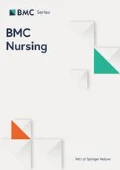Correction to: BMC Nurs 2018, 17(Suppl 1)
https://doi.org/10.1186/s12912-018-0301-3
After publication of this supplement [1], it was brought to our attention that in abstract S11, the author affiliation No. 1 is incorrect. It should be ‘Rotterdam University of Applied Sciences, Research Centre Innovations in Care, Rotterdam, The Netherlands’, but not ‘Department of Healthcare & Welfare, NHL University of Applied Sciences, Leeuwarden, the Netherlands’.
AnneLoes van Staa1, Janet Been-Dahmen1, Heleen van der Stege1, Denise Beck2, Mirjam Tielen2, Marleen van Buren2, Cora Braat3, Emma Massey2, Wendy Oldenmenger3, Erwin Ista2
-
1.
Department of Healthcare & Welfare, NHL University of Applied Sciences, Leeuwarden, the Netherlands;
-
2.
Erasmus University MedicalCentre, Dept. of Internal Medicine, Rotterdam, the Netherlands;
-
3.
ErasmusMedical Centre Cancer Institute, Rotterdam, the Netherlands
Correspondence: AnneLoes van Staa (a.van.staa@hr.nl)
BMC Nursing 2018, 17(Suppl 1):S11
Background
Self-management support is a core task for nurses, but it is unclear what it entails. Using Intervention Mapping, a nurse-led intervention was developed: people with kidney transplant (KT) and head-neck cancer (HNC) indicated their support needs. The intervention combines the assessment of self-management challenges using a conversational tool (Self-Management Web) with solution-focused communication techniques, including goalsetting, action-planning and monitoring progress. This pilot-study aimed to evaluate the feasibility and first effects of the intervention.
Methods
A controlled before-after evaluation study was conducted in 2 outpatient clinics of a Dutch University Hospital. To gain insight into fidelity, feasibility, and acceptability, we did interviews and observations. Quantitative methods consisted of pre-post surveys within-group comparison; and intervention (n = 23 KT; n = 27 HNC) versus historic control (n = 43 KT; n = 28 HNC) between-group comparison.
Results
The intervention was highly valued because of the open, holistic focus. It helped patients to build a relationship of trust with the nurse and made them more competent in problem-solving skills. Quantitative analyses indicated a significant change in self-efficacy (HNC) and in patient-centredness of nursing care (KT) but not in self-management skills.
Conclusions
This holistic self-management support intervention seems a promising tool to help chronic patients deal with daily life challenges.
Reference
van Staa A, et al. Experiences with a nurse-led self-management support intervention for people with chronic conditions; a mixed-methods approach. BMC Nurs. 2018;17(Suppl 1). https://doi.org/10.1186/s12912-018-0301-3.
Author information
Authors and Affiliations
Corresponding author
Rights and permissions
Open Access This article is distributed under the terms of the Creative Commons Attribution 4.0 International License (http://creativecommons.org/licenses/by/4.0/), which permits unrestricted use, distribution, and reproduction in any medium, provided you give appropriate credit to the original author(s) and the source, provide a link to the Creative Commons license, and indicate if changes were made. The Creative Commons Public Domain Dedication waiver (http://creativecommons.org/publicdomain/zero/1.0/) applies to the data made available in this article, unless otherwise stated.
About this article
Cite this article
van Staa, A., Been-Dahmen, J., van der Stege, H. et al. Correction to: S11 Experiences with a nurse-led self-management support intervention for people with chronic conditions; a mixed-methods approach. BMC Nurs 18, 3 (2019). https://doi.org/10.1186/s12912-019-0327-1
Received:
Accepted:
Published:
DOI: https://doi.org/10.1186/s12912-019-0327-1

